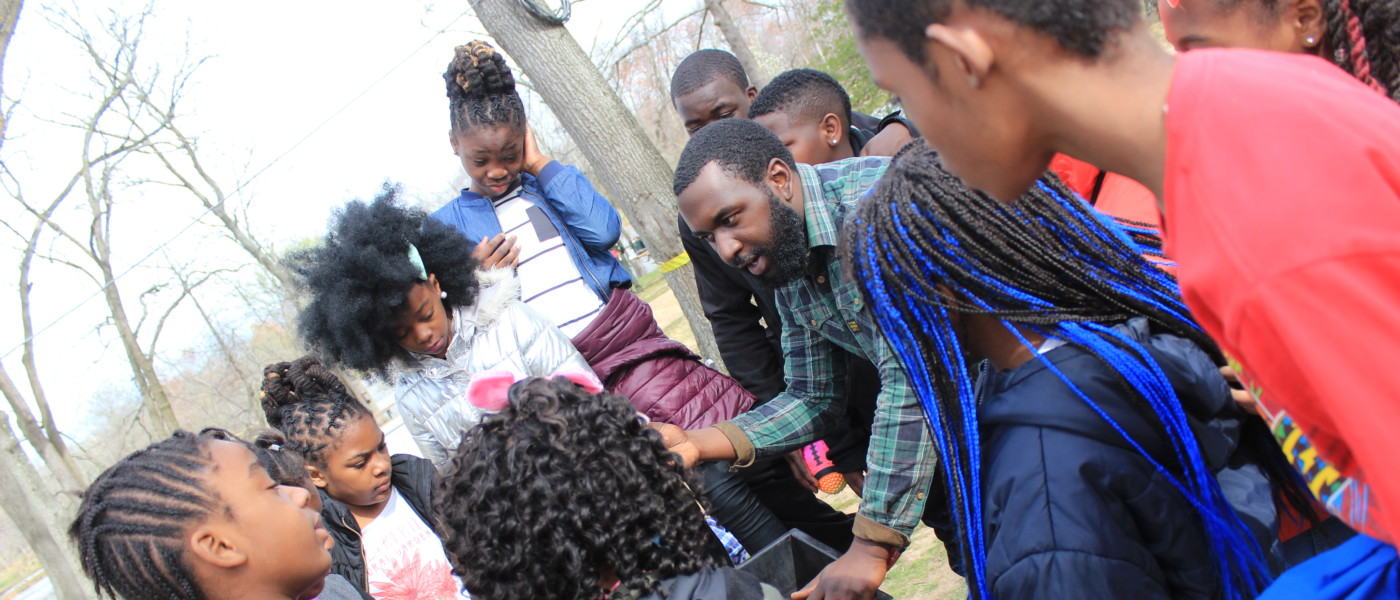This year Farm Aid is heading to the Washington, D.C. area, the place where national food and farm policy is written and sealed into law. In the shadow of the federal institutions that govern food and agriculture, lies a city with a growing local food system of its own. Since Farm Aid last visited the region in 2000, the District of Columbia has seen a tremendous boom in farmers’ markets, restaurants sourcing from family farms, urban agriculture, and a brand new Food Policy Council, which is pushing for policies that increase food access and boost the city’s food and farm economy.
Even if you live thousands of miles from our nation’s capital, the changes taking place there can serve as an example of our new food and farm future. We interviewed a handful of changemakers who are leading the way. Read on to hear what each of them had to say about the city they know and love, from stories about urban farms, to what it’s like to push for change in a city not tied to a state, to tips on the best kept food secrets in the city!
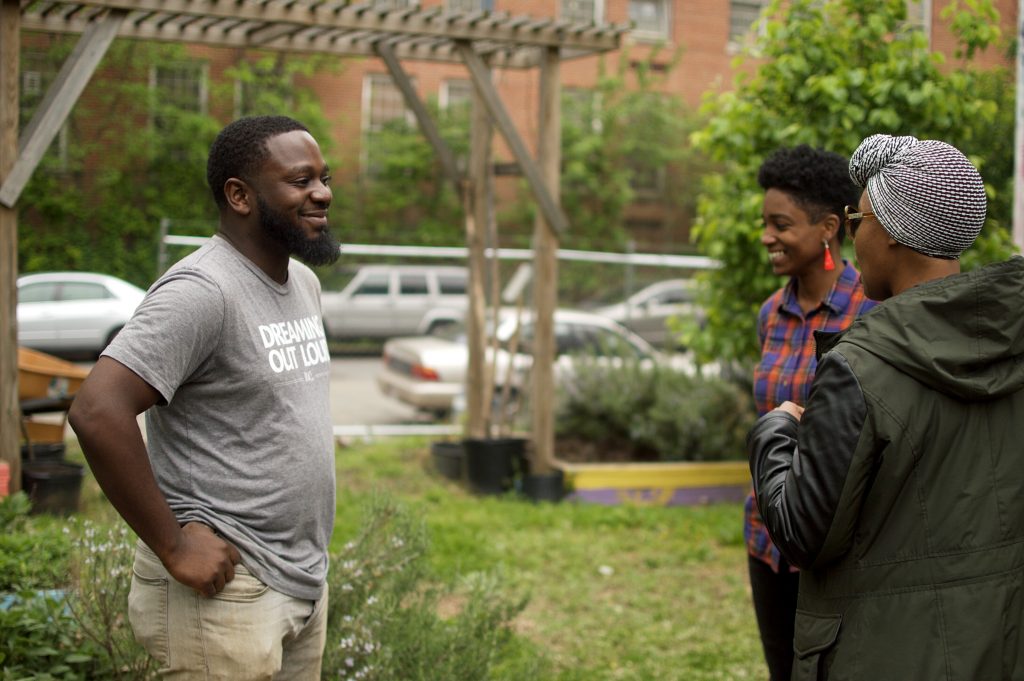
Christopher Bradshaw, Executive Director of Dreaming Out Loud, Inc.
Read Christopher’s interview. Tell us about your work in the D.C. food and farm scene: Farm Aid was last in the D.C. area in 2000. Back then, there wasn’t much of a food movement in Washington, D.C., but that’s really seemed to change. How has the D.C. food and farm scene evolved recently or since you have started this work? What do you think is unique to D.C. in terms of the challenges or opportunities of working in food and agriculture? What does it mean to be in the backyard of the White House and Congress and these major institutions that write our food and farm policy? What are the biggest challenges for creating a truly just and sustainable food system in the city? Knowing that we’re all working on such big, important problems, what keeps you motivated and inspired? Favorite local farm? Best food for a swampy D.C. summer day? Best kept food secret in D.C.? Lauren Shweder Biel, Executive Director of DC Greens Read Lauren’s interview. Tell us about your work in the D.C. food and farm scene: Farm Aid was last in the D.C. area in 2000. Back then, there wasn’t much of a food movement in Washington, D.C., but that’s really seemed to change. How has the D.C. food and farm scene evolved recently or since you have started this work? What do you think is unique to D.C. in terms of the challenges or opportunities of working in food and agriculture? What does it mean to be in the backyard of the White House and Congress and these major institutions that write our food and farm policy? What are the biggest challenges for creating a truly just and sustainable food system in the city? Knowing that we’re all working on such big, important problems, what keeps you motivated and inspired? Favorite local farm? Moutoux Orchards in Loudon County, VA is also a standout for me. Their food is grown/raised with so much care, and they have become an organizing force within their farming community. Best food for a swampy D.C. summer day? Best kept food secret in D.C.? Are you planning on attending the Farm Aid 2016 concert in Bristow? If so, who are you most looking forward to hearing on stage? Michael F. Curtin, Jr., Chief Executive Officer of DC Central Kitchen Read Michael’s interview. Tell us about your work in the D.C. food and farm scene: Farm Aid was last in the D.C. area in 2000. Back then, there wasn’t much of a food movement in Washington, D.C., but that’s really seemed to change. How has the D.C. food and farm scene evolved recently or since you have started this work? What do you think is unique to D.C. in terms of the challenges or opportunities of working in food and agriculture? What does it mean to be in the backyard of the White House and Congress and these major institutions that write our food and farm policy? What are the biggest challenges for creating a truly just and sustainable food system in the city? Knowing that we’re all working on such big, important problems, what keeps you motivated and inspired? Favorite local farm? Best food for a swampy D.C. summer day? Best kept food secret in D.C.? Xavier Brown, Founder of Soilful City Read Xavier’s interview. Tell us about your work in the D.C. food and farm scene: Farm Aid was last in the D.C. area in 2000. Back then, there wasn’t much of a food movement in Washington, D.C., but that’s really seemed to change. How has the D.C. food and farm scene evolved recently or since you have started this work? What do you think is unique to D.C. in terms of the challenges or opportunities of working in food and agriculture? What does it mean to be in the backyard of the White House and Congress and these major institutions that write our food and farm policy? All of the national political action takes place in Washington. But, I live in the District of Columbia. The growth of the D.C. food movement has all taken place on a grassroots community level. It is important to remember that D.C. does not have a voting member of Congress. D.C. does not have any true control over the laws that are put in place at the city level, because there is always the possibility that they can be overturned by Congress. Taxation without Representation. What are the biggest challenges for creating a truly just and sustainable food system in the city? We all know that food is connected to so many other issues. How can we connect the work that we are doing around food to other social justice issues such as employment, racial justice and climate change? It is important that we make it explicit how the fight to create a just food system helps to erase all systems that oppress people of color and the earth. Knowing that we’re all working on such big, important problems, what keeps you motivated and inspired? Favorite local farm? Best food for a swampy D.C. summer day? Best kept food secret in D.C.?
Click here!
First and foremost, I am a farmer – and the inheritor of a rich agricultural history. I am also the founder and executive director of Dreaming Out Loud, Inc. We’re a nonprofit social enterprise whose mission is to create economic opportunity within marginalized communities by building a healthy, equitable food system. I’m also privileged to serve as a member of the first-ever DC Food Policy Council. We are really excited to be able to play an impactful role on the ground and in public policy, as it relates to the future of the D.C. food and farm scene. As co-chair of the Urban-Agriculture and Food System Education Working Group, I’m looking forward to clarifying current implementation of legislation and proposing new measures to open up opportunities for urban farmers and rural linkages. On the ground, working deeply within communities, we are looking forward to collaboratively building a transformative urban farm and food hub behind a middle school in Washington D.C. – located in Ward 7, an area with only three grocery stores for 70,000 people.
The food and farm scene has grown considerably in D.C. It’s opened up to more people, it’s been creative, it’s been collaborative; it’s got a long way to go. One thing we want to make sure that stays at the forefront is equity, and the role that structural racism has played in shaping the current food system. Our work and D.C.’s food dialog must be intersectional (including housing equity, gender rights, education, etc.) and centered in ending white supremacy.
D.C. is challenged in that we are not a state, do not have a state department of agriculture, and have intense pressures from developers to turn every inch of the city into condos that displace long-term D.C. residents. We view food as a unique opportunity to advocate, agitate, and address equity issues through this lens.
To be in the backyard of the White House and Congress means that we have physical proximity to major institutions; however, we have to work harder – not being a state – to influence policies that impact our little city-state. We believe that the visibility of the first-ever D.C. Food Policy Council will help us to make a difference on the ground in our community and hopefully serve as another positive national example of what food justice, food sovereignty, and equity can look like.
The biggest challenges for creating a just and sustainable food system are creating a new system to bring low-income and landless people into models of collective ownership and benefit; dismantling a system of policies and subsidies that advantage corporate-agribusiness; and moving society to truly valuing food and the folks who grow and harvest it.
What keeps me motivated while working on big, important problems are the deep, rich relationships we cultivate while doing the work. I find resolve when we are at our farmers’ market and someone tells us that they are thankful for our presence – that they are fighting HIV and sickle cell anemia and that they need the market to get healthy food. That community member working to manage their health is connecting with formally seasonal migrant workers who now own their own farm. Experiences like that will change your life every day. It’s inspiring to imagine the ways we can build bridges between communities, urban and rural.
Among our favorite farms are Good Sense Farm and Apiary, Black Dirt Farm Collective, and Three Part Harmony Farm. We also love our Dreaming Out Loud Organic Garden which we like to call a micro-farm…lol. Dreaming Out Loud is also developing a 2-acre farm and food-hub in Ward 7 in Washington, D.C. which will become our favorite farm once it comes into being in 2017.
The best food for a swampy D.C. summer day is ice cream, or sorbet from Ruby Scoops.
Dreaming Out Loud’s Organic Garden at Blind Whino is D.C.’s best kept food secret. It’s tucked away behind a beautiful work of public art, formerly Friendship Baptist Church, and has been the site of programs serving youth and the community. The backdrop is so eye-catching and powerful; we add the depth of community connections that makes the garden come to life.
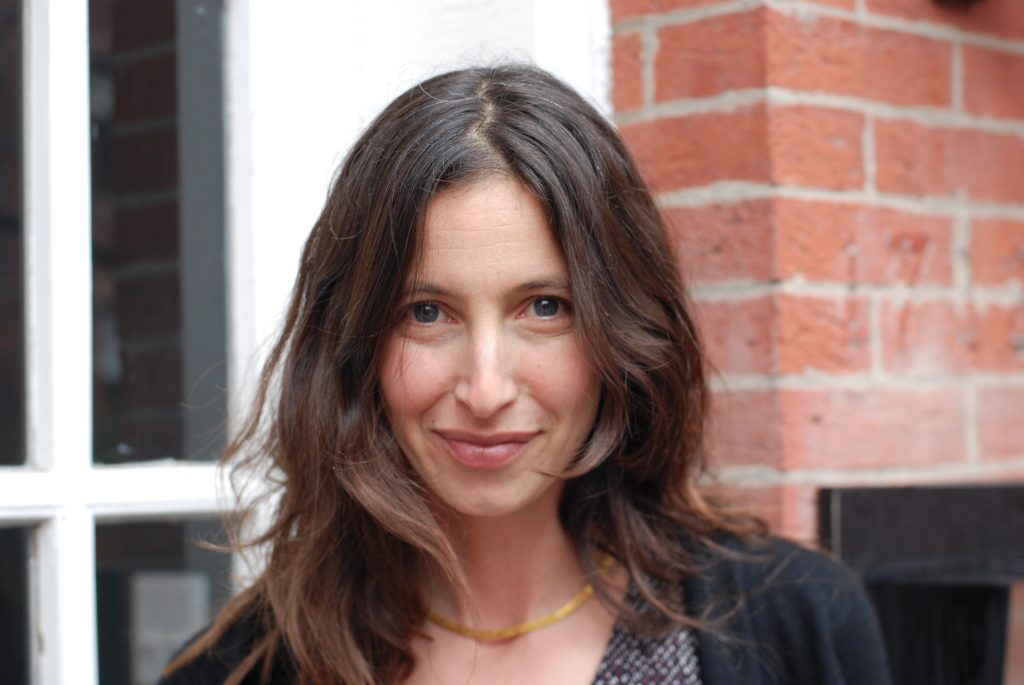
Click here!
DC Greens uses the power of partnerships to support food education, food access and food policy in the nation’s capital. We are working towards a city where food education is on the menu in every classroom, where doctors are writing prescriptions for fresh fruits and vegetables as a matter of course, where urban agriculture is a valued element of our cityscape, and where zipcode does not determine life expectancy.
D.C. was in a completely different situation in 2000. I think that many of the major D.C. policy shifts really began in 2010 with the Healthy Schools Act and the FEED DC Act, which (between them) made major municipal investments in school gardens, local procurement for cafeteria food, and creating healthy corner stores in underserved areas of the city. Since then, things have continued to blossom: we have seen the passage of exciting urban agriculture legislation that provides tax incentives to private landowners when they lease to urban growers; we have seen major municipal investments in nutrition incentive programs such as DC Produce Plus and a Fruit and Vegetable Prescription Program. We have a newly appointed DC Food Policy Director and Food Policy Council. D.C. currently has 55 farmers’ markets and 108 school gardens. While we still have a long way to go to create a healthy and equitable food system in the District, we are a definitely a city in bloom.
We are really unlike any other place in the country: we are essentially a city-state. This means that arguments based on supporting “the local farm economy” really don’t mean the same thing here as they do in other major cities. For example, in Detroit, Michigan’s economy really matters. Not so in the relationship between D.C. and its farm communities (Virginia, Maryland, Delaware, etc.). While this provides even more incentive to bolster the hyper-local urban farm economy, the cost of land in the District is so much higher than in places with thriving urban agriculture communities (e.g., Detroit, Baltimore, Cleveland), that we really have a different calculus at play in that terrain as well.D.C. also presents tremendous opportunities. We have an extremely progressive City Council and a supportive Mayor who all understand the significance of a healthy food system in combating the health disparities that plague our city. In listening to colleagues across the country, it has become very clear to me that the level of municipal investment that we see in D.C. has few parallels nationwide. I feel proud that our city is working at the forefront of the food movement, because we are in the shadow of the Capitol. We have the power to be a model for the nation.
As an organization, we have mostly focused our sights on the local level. However, we love that we can also be a resource for the national conversation. We’ve hosted groups of staffers from the Senate Agriculture Committee to learn more about farm to school programs and urban agriculture. We’ve given briefings on the Hill about the success of D.C.’s Fruit and Vegetable Prescription Program. We’ve organized tours for congressional aides to see the farmers market incentive program in action. Being in the backyard of our federal government means that we have an incredible ability to bring this city’s practice to the national policymakers.
I think that some of the biggest challenges are the legacy and continuation of structural violence that has been carried out upon communities of color in the District. There are currently three grocery stores in Southeast D.C., each serving approximately 75,000 people (compare that to stores in more affluent neighborhoods of the District that serve 10,000 each). When people can’t even find healthy food in their neighborhood, it is no wonder diet-related chronic illnesses are among the leading causes of death in lower-income areas.Another major challenge is one that runs throughout the food movement – how do you reconcile the need to pay a fair wage to farmers and account for the real cost of food, while still ensuring that healthy food is affordable to all? Because we believe that access to healthy food is a basic human right, we also believe that cities and health systems can play an important role in filling the gap so that food can be fair for all.
There are certainly times when I feel overwhelmed by the magnitude of the work. However, I believe that this work relies on relentless incrementalism, which means that patience, fortitude and tenacity are required. Also a healthy dose of optimism. I am inspired every day – inspired by the passion of my co-workers and partners. Inspired by the communities that drive our work, and the leaders within every sector that are committed to shifting the culture (doctors, teachers, farmers, government agencies). I have already seen real change in the seven years that I’ve been working on these issues, and I believe that we’re on the cusp of so much more.
Do I have to pick one? We have so many favorites! I personally love Rocklands Farm in Poolesville. They are close to the city, and have become a resource for teachers and schools across the District that want to provide a richer educational farm field-trip experience to their students. They also let me “rent” a couple of chicks from them a few years ago, which provided endless joy to my kids!
All that I ever want to eat when the weather gets swampy is a salad. D.C. happens to be the birthplace of sweetgreen (lucky us!). Get yourself a sweetgreen salad, and you are supporting regional farmers. I’d follow it up with some Dolcezza gelato – also a passionate supporter of local farmers and better gelato than anything you’ll find in Rome. I’m serious. I’ve done extensive taste tests.
The best kept food secret in D.C. is that we have an amazing food scene! If you haven’t been here since 2000, you’ve got A LOT to look forward to. One of my favorite secret spots is Little Sesame – an Israeli style hummus shop in Dupont circle (in the basement of DGS Delicatessen). Owners are also major supporters of local farmers, and their offerings are sensational.
Definitely planning to be there! It’s a great line up. I think I’m most excited about Alabama Shakes, but there are so many legends up there. It should be a blast!
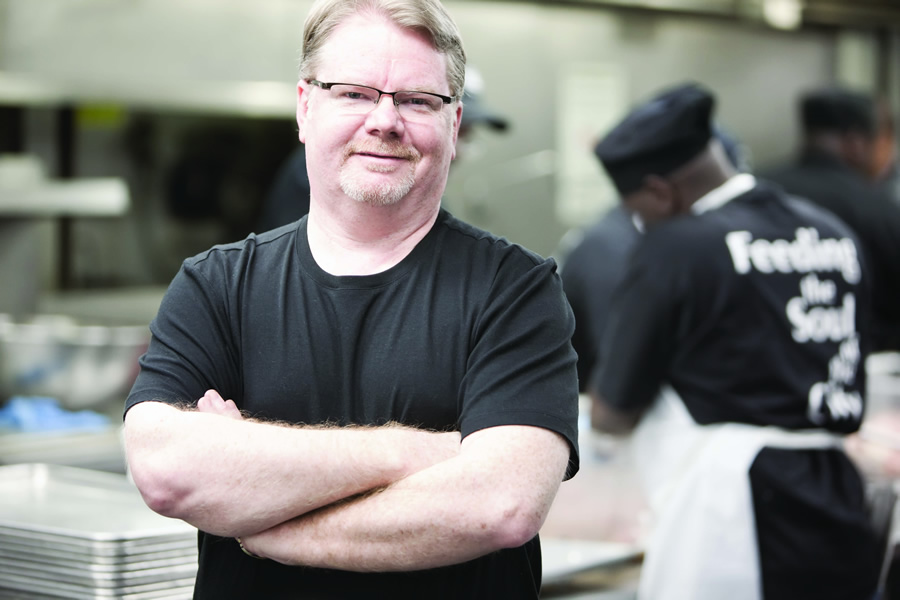
Click here!
Since our founding in 1989, DC Central Kitchen has been a pioneer working to combat hunger and poverty by using recovered food that would have otherwise gone to waste to prepare 5,000 meals for homeless shelters, halfway houses, and treatment facilities across D.C. We receive and recover donated food from distributors, wholesalers, grocery stores, farms, and restaurants, and we operate weekly gleaning trips to nearby farms to pick what remains in the fields for our nutritious meals.DC Central Kitchen has worked in partnership with local farms for more than 15 years to source fresh, healthy produce for our programs. In 2010, we began procuring local produce for our Healthy School Foods program and have invested over $1.2 million dollars in local farms. Currently, we provide meals for 15 D.C. schools (12 of which are in the D.C. Public Schools system), sourcing at least one item on each day’s lunch menu from a local farm. We partner with over 30 farms each year to source local produce, protein, and dairy, with an emphasis on buying aesthetically imperfect produce whenever possible to create a new market for would-be-wasted product. DC Central Kitchen’s Healthy School Foods program is a nationally recognized model and recently won the Golden Carrot award from the Physician’s Committee for Responsible Medicine for the healthfulness of our school lunches.But our work doesn’t end with simply feeding people. In order to address the root cause of the poverty plaguing our city, DC Central Kitchen runs a Culinary Job Training program that provides the knife and life skills marginalized men and women need to get –\ and keep – a job. Employing graduates of our job training program wherever possible, DC Central Kitchen also runs two successful social enterprises: Healthy Corners, our corner store delivery program delivering fresh fruits and vegetables and healthy snacks directly to corners stores in D.C.’s food deserts; and Fresh Start, our catering outfit staffed entirely by graduates of our training program.
While food waste is a hot topic in 2016, when we were founded in 1989, no one was talking about it. Even a few years ago, no one was talking about it. In the past year, food waste has risen to the forefront of conversations surrounding food sustainability and access in D.C.Most recently, we partnered with the international nonprofit Feedback to bring Feeding the 5000 to Washington, D.C. On May 18, in an effort to shed light on the growing crisis of food waste and the practical solutions available, we hosted this community event – with the support of more than 40 like-minded organizations and chefs – and provided the public with a free meal made entirely from fresh, top-quality ingredients that would have otherwise been wasted.With Feeding the 5000 and the proposed legislation around food recovery and date labeling by Congresswomen Chellie Pingree, there is new energy around food waste. D.C. recently launched its own Food Policy Council to promote food access, food sustainability, and a local food economy in the District of Columbia. Our Chief Development Officer, Alex Moore, was recently appointed to the Council. Washington, D.C. has also become a culinary destination. Hundreds of new, exciting restaurants have arrived, putting D.C. on the food scene map and expanding the demand for local and specialty ingredients in restaurants throughout the city.
The District of Columbia is unique in that we are an urban center surrounded by farmland on all sides. Maryland, Virginia, Delaware, West Virginia, and Pennsylvania are home to more than 12,900 farms, most of which are looking to find a market for their product in D.C. Our proximity to farms presents many opportunities to purchase reduced-price, “ugly” produce that won’t make it to the supermarket shelves.
One of the biggest food-related challenges in D.C. is the limited access of fresh fruits and vegetables in chronically underserved neighborhoods. D.C.’s food desert crisis is significant, with nearly 200,000 residents living on blocks where the closest healthy food retailer is three times farther than the closest fast food or convenience store.
Our proximity to Capitol Hill and the White House has allowed DC Central Kitchen to build meaningful relationships with policymakers – to share our expertise, lessons we’ve learned, and discuss how we can all do better, together. We are consistently asked to provide our opinion and expertise on the issues of food waste and recovery, local farm procurement and more on local and national government platforms.
Infrastructure, such as storage, processing capacity, and vehicles, are needed to move large amounts of food to where it is needed most. Recovering food that would otherwise be wasted and delivering it to those in need, purchasing produce from local farms and using it to prepare healthy meals for kids, or getting produce into food deserts, all require significant investments in infrastructure to make happen.
It’s motivating to see even the smallest impact we’re able to have on our community. Whether it’s a student tasting broccoli for the first time at one of our “Fresh Feature Friday” taste tests, or seeing the economic impact we have on the business of a local farmer, every day is another step as we practice what we refer to as “relentless incrementalism.” Eventually, our relentlessness, our ability to prove what’s possible will result in structural changes to our food systems that are sustainable for the future.
Public House Produce in Luray, VA, which grows corn, broccoli, and butternut squash for our Healthy School Foods program.
A bottle of cold pressed juice from our D.C.-based partners Misfit Juicery. The company not only hires graduates of our training program, but its business model turning wasted fruit, vegetables, trimmings and tops into cold-pressed juices also aligns with our core values.
DC Café, a small hole-in-the-wall in Dupont Circle with fantastic Lebanese food.
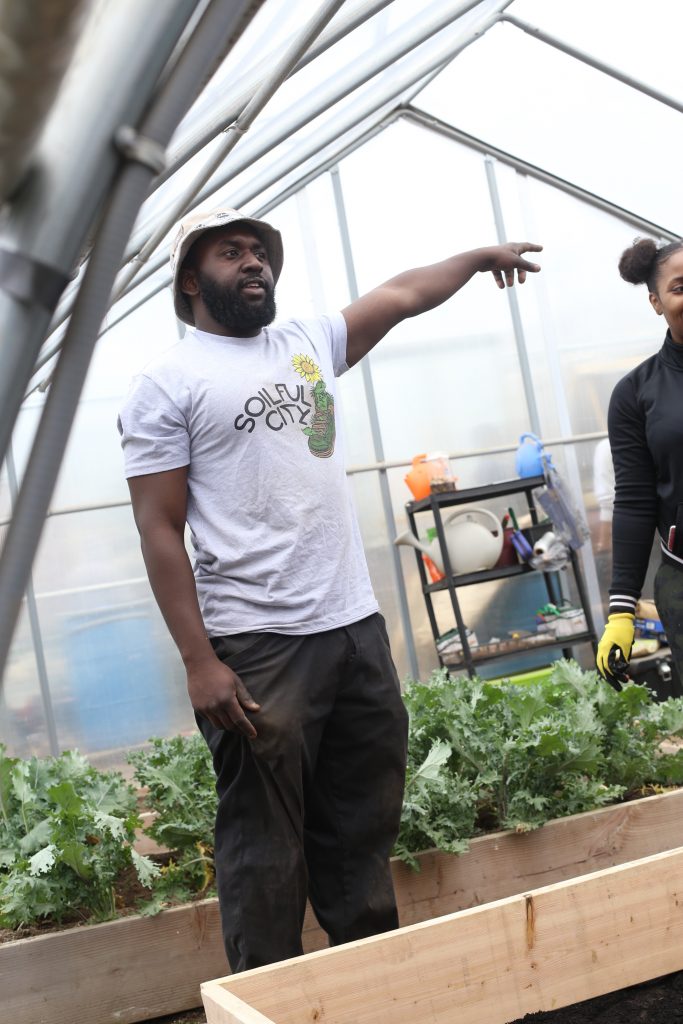
Click here!
I work along many different intersections in the D.C. food and farm scene. By day, I work at the city’s Department of Parks & Recreation as a Small Parks Specialist, where I help people interested in farming in the city find plots of land available. But, I also started Soilful City to assist in the growing process in many different communities in D.C. I show people how to compost; I teach communities how to grow food and work with people to create new policy around food.My main goal now is creating ways to use food as social change agent. My guiding questions are: How can farming and food be a way to create a new economy in D.C. that is based on equity and equality for all people? How can farming and food be used as a tool to create a new culture of health that addresses racial injustice and healing from different forms of trauma? How can farming and food create new business models that allow workers and communities to have equity into the system?
Since 2000, the food movement has really exploded in the D.C. There are a number farms and nonprofits that have been working to create a “new food economy,” to create better food access for all people and to use food and agriculture as a social change agent. New city policy has allowed potential growers increased access to land and we recently confirmed the DC Food Policy Council.
D.C. is a very small city, so there’s a very finite amount of land available for urban growing. But we have important developments to support urban food and agriculture on our scale.The D.C. Urban Farming and Food Security Act has created the condition for more farms to be created, by allowing a tax abatement for land owners who allow food to be grown on their land. The Cottage Food Act that passed a few years ago allows people to create food products without having to use a commercial kitchen, as long as they gross no more than $25,000 in sales. The Crossroads Community Food Network is creating a food entrepreneurs incubator program that will allow new food entrepreneurs to get commercial kitchen space and business training. In D.C. Wards 7 and 8, there is movement to create community operated grocery cooperatives that will put control of the food that is in a community into the hands of the people.Creating ways to scale up urban farming in D.C. is something that will be a challenge, moving forward. I believe the best way to solve this problem is through growing cooperatives that allow communities to pool resources.
For someone who has grown up in D.C. his whole life, I have always felt a disconnect between the laws and bills that are passed in the White House and Congress and the city where I do my urban agriculture work.
I get energy from my community. I count all of my wins: big or small. I understand that I am apart of a movement that is bigger than me, so I try to mindful to always empower others so that we all have great vibes to share with each other.
Three of my favorite local farms are Black Dirt Farm, Three Part Harmony Farm and Eco City Farm.
Watermelon
Ethiopian Food
